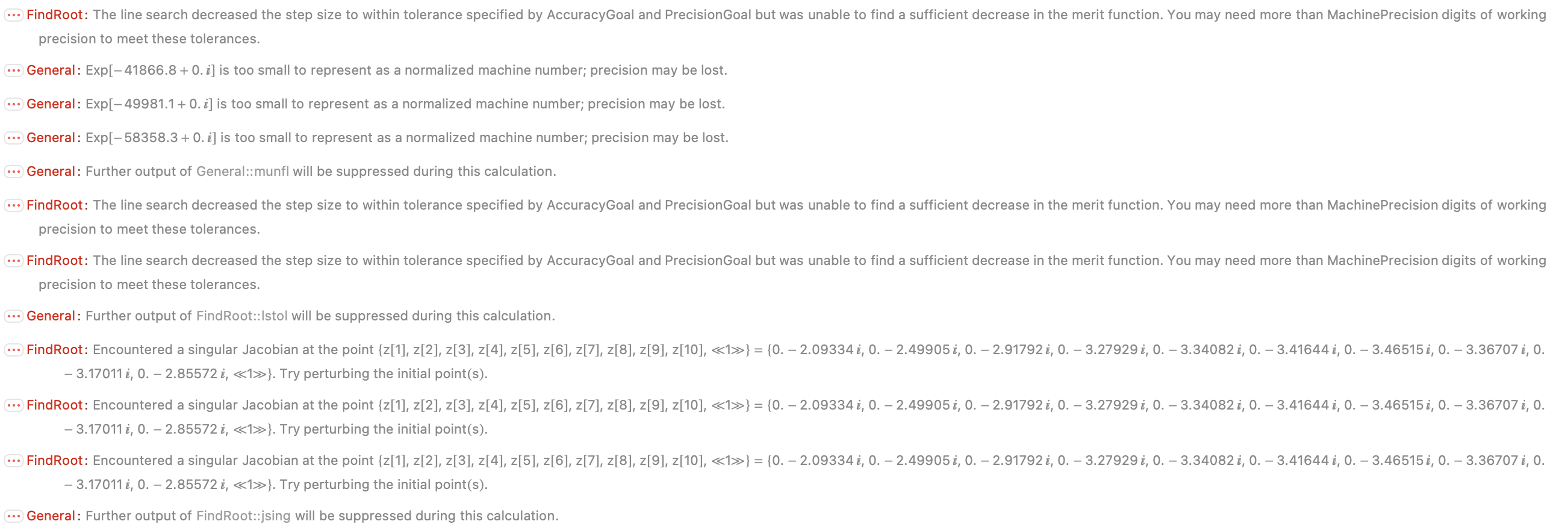Whoever is reading this have to be patient as the code is slightly long and I have explain each section in order to explain the problem. So I want to solve the set of non-linear algebraic equation using FindRoot. Here is the first section of the code,
np = 11;
zbound[\[Delta]_] := Re[z /. FindRoot[Cos[\[Delta]] Cosh[3 \[Delta]] + Sin[\[Delta]] Sinh[\[Delta]] + (z(-4\[Delta] Cos[\[Delta]] Cosh[3 \[Delta]] + Sin[\[Delta]] (Cosh[\[Delta]] - 4 \[Delta] Sinh[\[Delta]]) + Cos[\[Delta]] Sinh[3 \[Delta]]))/\[Delta] == 0, {z, 0.1}]]
zvalue = Table[z[i], {i, 1, np}];
guess = Table[(-((np + 1)/2) + i)*(0.5*I)/10000, {i, 1, np}]
eqn[\[Delta]_] := Table[(E^(-I*z[i]*20000) == \!\(\*UnderoverscriptBox[\(\[Product]\), \(j = 1\), \(np\)]\(If[j != i, \*FractionBox[\((I*\((\*FractionBox[\(z[i] - z[j]\), \(2\)])\) - zbound[\[Delta]])\), \((\(-I\)*\((\*FractionBox[\(z[i] - z[j]\), \(2\)])\) - zbound[\[Delta]])\)], 1]\)\)), {i, np}];
Just copy and paste the above code into Mathematica Notebook. The last line is the non-linear equation I want to solve.
eqnsol[\[Delta]_, initialvalue_] :=zvalue /.FindRoot[eqn[\[Delta]],Transpose[{zvalue, initialvalue}], MaxIterations -> 400]
This will find the solution of the equations that depends on $\delta$. With the initial value as "guess",
Block[{\[Delta] = 1.60919303}, eqnsol[\[Delta], guess]]
This will give me the solution of a particular value of $\delta$. Now, I want to evolve the solution by increasing the value of $\delta$.
\[Delta]list = SetPrecision[Range[1.60919303, 1.60919305, 10^-9], 10];
approxData = {};
Do[sol = eqnsol[\[Delta], guess];
AppendTo[approxData, sol];
guess = sol;, {\[Delta], \[Delta]list}]
This will evolve the solution by updating the guess as previous solution. I can plot the data with respect to $\delta$.
GraphicsRow[{ListPlot[Table[Transpose[{\[Delta]list, Re[approxData[[All, i]]]}], {i, 1, np}]],ListPlot[Table[Transpose[{\[Delta]list, Im[approxData[[All, i]]]}], {i, 1, np}]]}]
No problem till this point. Now if I want to increase the range of $\delta$,
\[Delta]list = SetPrecision[Range[1.60919303, 1.6091931, 10^-9], 10];
Running the same loop, you get error, and it spits out some junk values.
Reasoning behind it I believe is that as the solution increases, the exponent in the LHS of the equation is decreasing, and at some point it becomes smaller that the precision of the code. I tried increasing the WorkingPrecision but it didn't work.
Note: If someone is able to solve the problem, try also increasing the value of np to some odd integer to see the solution holds or not.





FindRoot) in the definition ofzbound. Usezbound[\[Delta]_] = Re[SolveValues[Cos[\[Delta]] Cosh[3 \[Delta]] + Sin[\[Delta]] Sinh[\[Delta]] + (z (-4 \[Delta] Cos[\[Delta]] Cosh[3 \[Delta]] + Sin[\[Delta]] (Cosh[\[Delta]] - 4 \[Delta] Sinh[\[Delta]]) + Cos[\[Delta]] Sinh[3 \[Delta]]))/\[Delta] == 0, z][[1]]];$\endgroup$